My mother was a concert pianist, thus I have been intimate with all types of pianos, and appraised pianos for years. Many of my clients DO own an upright, a baby grand or a grand piano they “can’t take with them” due to a downsize. They either need to sell or to donate.
Let’s talk about donating the piano.
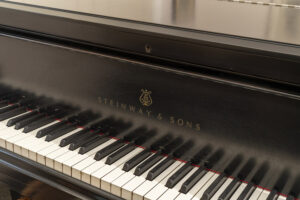 You must donate to a registered 501c3 (not-for-profit) organization to take an allowable Federal Tax deduction. If you get lucky enough to find a NOT-FOR-PROFIT organization to take your piano, consider yourself FORTUNATE. Many of our local charities won’t take them.
You must donate to a registered 501c3 (not-for-profit) organization to take an allowable Federal Tax deduction. If you get lucky enough to find a NOT-FOR-PROFIT organization to take your piano, consider yourself FORTUNATE. Many of our local charities won’t take them.
I wrote a donation appraisal recently for a lucky client whose church wanted her Steinway grand. I say lucky because she MAY have had trouble selling the instrument she generously donated.
Why people have trouble selling pianos:
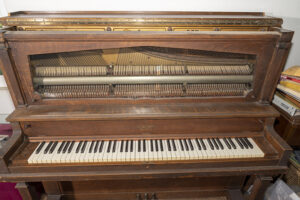 A) In an affluent place like Santa Barbara, I find that if a family has SPACE for a Steinway (or similar commodity brand) and the money for it, they tend to buy from a dealer. Dealers will sell a NEW piano, or a warrantied one their shop re-conditioned, rebuilt, restored, or refurbished. This is a PLUS. Pianos are NOT just furniture, they’re technical machines, with many moving parts. Restoring a piano might cost more than its WORTH.
A) In an affluent place like Santa Barbara, I find that if a family has SPACE for a Steinway (or similar commodity brand) and the money for it, they tend to buy from a dealer. Dealers will sell a NEW piano, or a warrantied one their shop re-conditioned, rebuilt, restored, or refurbished. This is a PLUS. Pianos are NOT just furniture, they’re technical machines, with many moving parts. Restoring a piano might cost more than its WORTH.
B) Private sellers and buyers incur both the costs and the dangers of moving a piano that weights over 800 lbs. I’ve seen damage to entryways, walls, floors, and concrete. A competent expert piano mover will set you back $800 or more. That move might exceed the worth, especially if it has not been refurbished.
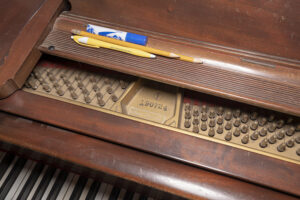 C) If you DO buy a piano from a private party, you should pay for a certified technician to fully investigate it. A repair cost might surpass the piano’s worth. You can find great “piano techs” in Santa Barbara, but they work for a living, and what they do is an art—for which you will pay. Ask for honest records from the seller of annual tunings, servicing, and their technician’s report of the condition of the felts, hammers, strings, sound board etc.. Many people don’t save those records or don’t have an annual tuning and check-up. Finally, ask where the piano has LIVED. If near the ocean, this might prove harmful to the metal moving parts. If it lived in high altitude, that might also cause a problem.
C) If you DO buy a piano from a private party, you should pay for a certified technician to fully investigate it. A repair cost might surpass the piano’s worth. You can find great “piano techs” in Santa Barbara, but they work for a living, and what they do is an art—for which you will pay. Ask for honest records from the seller of annual tunings, servicing, and their technician’s report of the condition of the felts, hammers, strings, sound board etc.. Many people don’t save those records or don’t have an annual tuning and check-up. Finally, ask where the piano has LIVED. If near the ocean, this might prove harmful to the metal moving parts. If it lived in high altitude, that might also cause a problem.
Many clients decide not to sell, but DONATE.
You can take a tax deduction when you donate a piano according to IRS rules. The IRS calls this type of donation a noncash charitable contribution. Look up these rules and find the form to submit with your tax return on IRS.GOV. If you sell a large asset, such as a house, in the tax year of your non-cash charitable contribution, a deduction might help as an offset. A qualified appraiser often writes an appraisal for a piano worth over $5,000, and a donation worth over $20,000 needs an accompanying written appraisal report from a qualified appraiser, according to the IRS.
Surprised at the Fair Market Value
My clients often act surprised at the Fair Market Value of their piano; here are the reasons why:
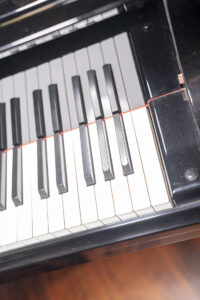 A) Fair Market Value is a type of valuation defined in the Tax Code. The IRS specifies that Fair Market Value be researched and found for a non-cash charitable contribution. Fair Market Value is NOT the insurance replacement cost, it’s the value of the piano in the most common market for the type and condition. The method for finding Fair Market Value is often the “comparable sales” method. To arrive at the Fair Market Value of your piano, I compare yours to those SIMILAR that recently SOLD.
A) Fair Market Value is a type of valuation defined in the Tax Code. The IRS specifies that Fair Market Value be researched and found for a non-cash charitable contribution. Fair Market Value is NOT the insurance replacement cost, it’s the value of the piano in the most common market for the type and condition. The method for finding Fair Market Value is often the “comparable sales” method. To arrive at the Fair Market Value of your piano, I compare yours to those SIMILAR that recently SOLD.
B) I find comparable sales based on the date of manufacture, the condition, the technical condition, and the case condition, to mention a few valuation factors. I also consider the BRAND and era in which the piano was built. Steinway Grands, for example, had a GOLDEN AGE in the 1920s. I never compare your piano with those OFFERED, unconsummated sales, especially those “would you take it prices” offered on sites like eBay. I find prices actually PAID.
Subjective factor in valuations of pianos!
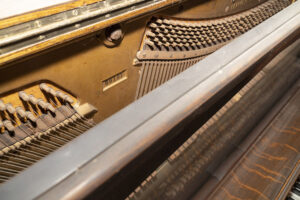 C) Each piano is unique because of the uniqueness of the mechanical parts and the case itself due to age and wear, and other factors. Value is, in great part, based on condition.
C) Each piano is unique because of the uniqueness of the mechanical parts and the case itself due to age and wear, and other factors. Value is, in great part, based on condition.
Let’s say you own a piano in original condition from the 1930-40. Your family never restored or rebuilt any significant workings inside the case. In any other type of antique “original condition” sounds like a good thing, but often NOT a “value increaser” in the piano market. I research comparable sales of pianos sold by reputable dealers. Fine dealers generally offer and sell refurbished, restored, or better yet, rebuilt pianos. Each of those terms means a certain level of re-working of the piano, inside and 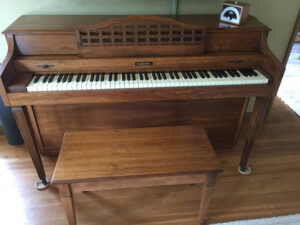 outside. Sometimes finding comparable sales for piano in original condition becomes difficult. Thus, I take the selling price of a re-worked piano, and subtract that restoration cost to establish Fair Market Value of YOUR piano.
outside. Sometimes finding comparable sales for piano in original condition becomes difficult. Thus, I take the selling price of a re-worked piano, and subtract that restoration cost to establish Fair Market Value of YOUR piano.
Finally, in the discussion of valuation for the purposes of a donation, you must ask around. NOT MANY charities want to tackle a piano that is not technically sound. What many charitable organizations that DO accept pianos as non-cash charitable donations fear is that they will be landed with a piano for which they have to pay to PLAY.